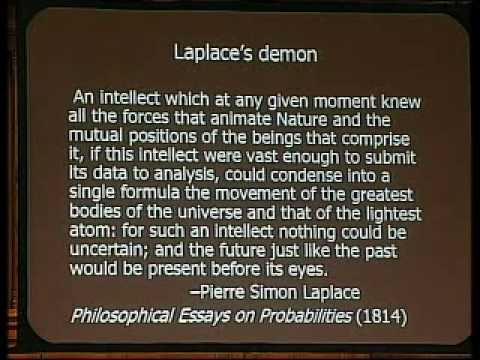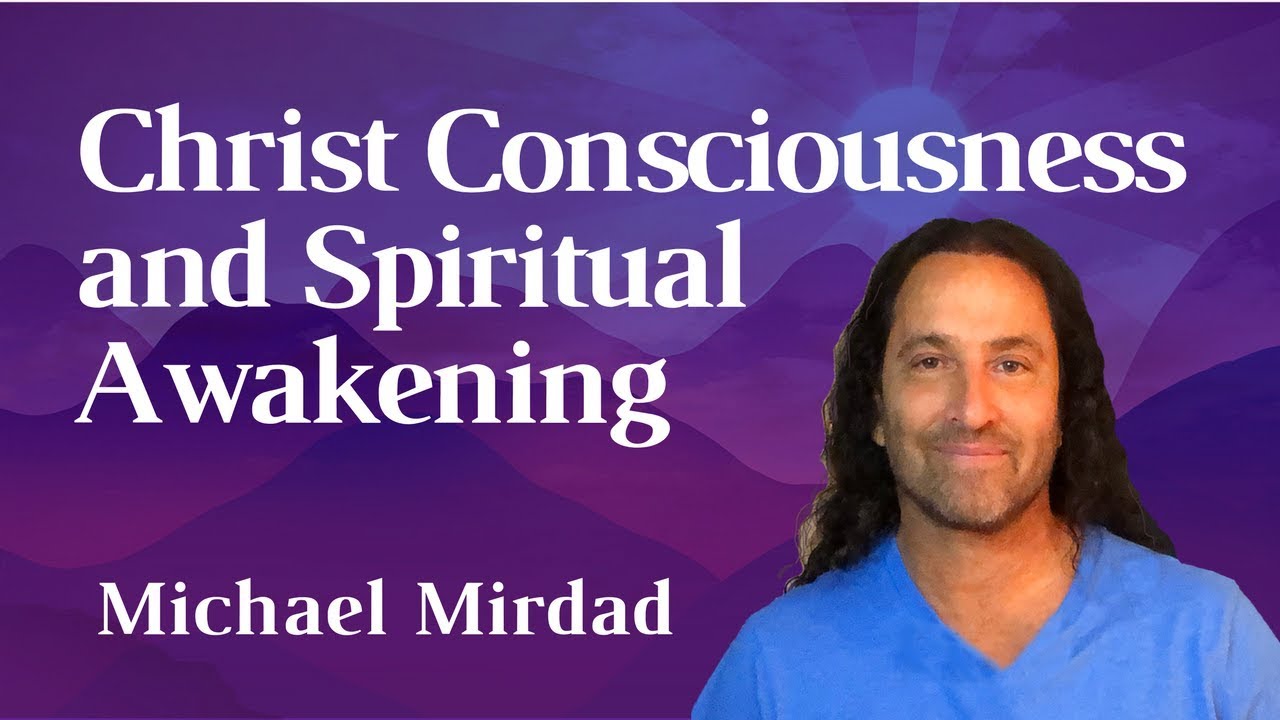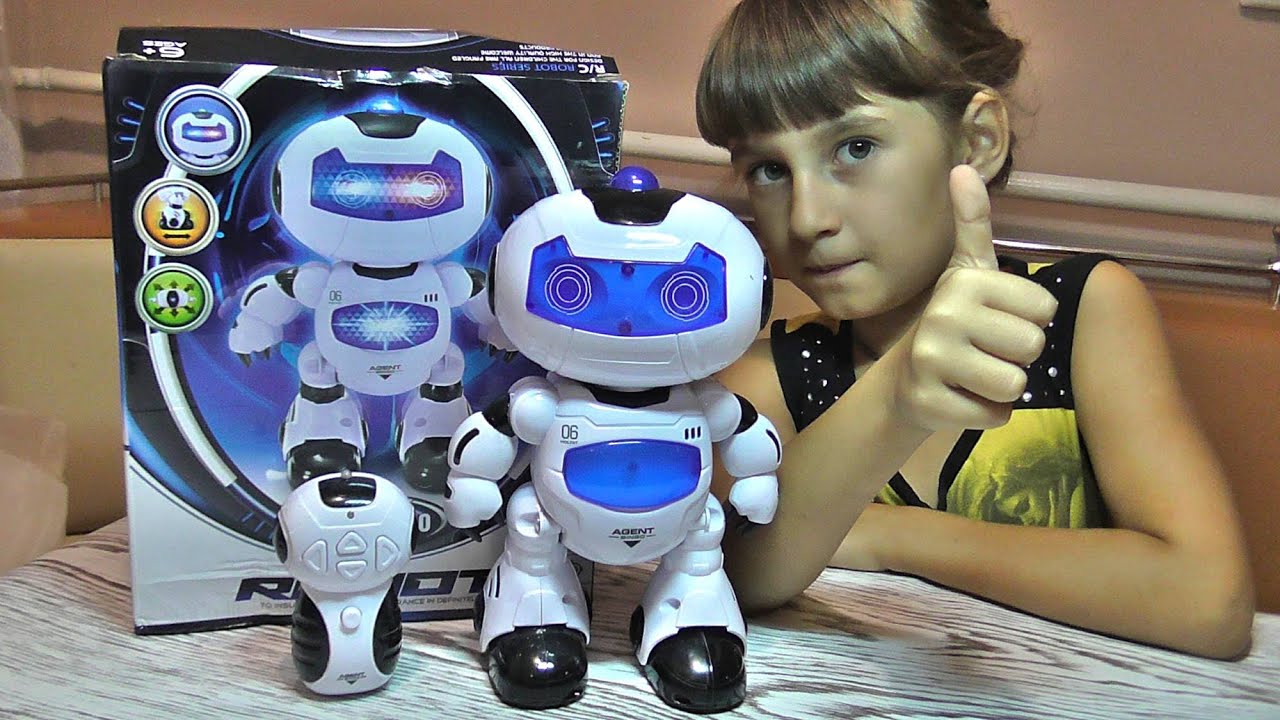The University of Edinburgh
A public lecture by Daniel C. Dennett, Professor of Philosophy at Tufts University, entitled “Is Science Showing That We Don’t Have Free Will?”
In his lecture, Professor Daniel Dennett discusses some of the current work in psychology bearing on this question.
He also drew on Hume, Darwin and Turing, three Enlightenment heroes.
Part of the University of Edinburgh’s Enlightenment Lecture Series.
Source




With respect to the Laplace's demon argument of predictability.
Wouldn't running this universe be equivalent to waiting to see what would happen in the real universe? It seems to me that the agents in that sub universe are just as real as the real ones.
Here are some things that have nothing to do with free will:
1. A brick is more avoidable than a bullet
2. Some chess programs are better than others
3. It is impossible to reproduce exact same experimental conditions
4. Evolution means that we can do new things
All he says is that human beings have evolved (and learn as individuals) to know what is right and wrong and can behave well or poorly. Which I agree with. But that doesn't mean that it's not all determined.
what about it?
0:38 nobody understands this joke? No laughing in the hall. 🙂
you're stupid
I disagree with the statement that physics is indeterministic.
And the illusion of free will is an illusion.
To be free, we need the ability to do otherwise. So what would that look like? Well I suppose it would look like me doing other than what I do. In that context, I definitely don't want freedom, because that's meaningless in a world moving forward in time.
Hard determinism apparently tries (too hard) to avoid describing our experience. We (seemingly) make choices all day long, but it's not us. Well that just passes the buck. Something IS making choices and getting a predictable outcome.
I'm a determinist btw, I know it's hard to tell. But now that I've stated that, it's probably easy to tell which kind.
0:38:05 Top left: 1 sleeper + 1/2 sleeper
There was a well written article in “The Spiritual Scientist” clarifying this point. Destiny determines the consequences of our actions, not the actions themselves. This is a statement made by Vidura, which clearly says that the jiva (soul) has free will to act; but he has no freewill to choose the consequences of the action.
If these differences are understood then we can better get to grips with the notion of free will as it should be. Otherwise, we’ll belabour ourselves with incompatible explanations.
Ys Kesava Krsna Dasa.
It is worth remembering that a bound person cannot produce free results, for his so-called free will is bound by delusion. Any ‘free will’ that causes further bondage or consequence, can never be true free will. This is why there is no such thing as free will in the first category of Bound Free Will.
A free agent, on the other hand, cannot cause bound results. A free agent can only cause acts of freedom. So this comes in the second category of free, free will. Anyone who accepts the lotus feet of such a free soul will also act freely.
Under the influence of delusion, our bound free will causes further bondage and consequence. The free will mentioned in comment 8 refers also to bound free will. The simple logic is that anyone who is bound, will commit further bound results from bound free will.
The free will Srila Prabhupada usually speaks of in response to questions of free will, come in the category of bound free will. He emphasises how we each have our minute independent. Once having chosen to turn our backs to the Lord, the curtain of delusion covers us all.
Here is another way of looking at how the free will we are accustomed to is not real free will, but bound will. Let us categorise into two groups: (1) Bound free will, and (2) Free, free will.
Devotee: Srila Prabhupada? Why God gave to man free will if He knew the man would fall down in the material world?
Prabhupada: If you have no free will, then you are a stone. The stone has no free will. You want to be stone? Then you must be, must have free will. But don’t misuse your free will. But don’t try to become stone. That is not life.
[Ref. VedaBase > Bhagavad-gita 15.15 — August 5, 1976, New Mayapur (French farm)]
Svarupa Damodara: Our free will.
Prabhupada: Yes.
Svarupa Damodara: God interferes.
Prabhupada: Yes. That is Krsna’s special favor. Because by your free will you are going to hell. If Krsna interferes, that is Krsna’s special favor. Just like a child is going to touch fire by free will, and father, “Eh, don’t do it.” That is his special favor.
[Ref. VedaBase> Morning Walk — December 4, 1973, Los Angeles]
Hrdayananda: So Prabhupada, if some people say, “Well, I have no free will,” that means that they are actually lazy.
Prabhupada: Yes. You have got free will, but must utilize it properly. That is free will. Free will means to utilize it properly. That is free will.
Svarupa Damodara: So people… Sometimes Krsna interferes in the free will? Prabhupada: Ah?
Swedish man (3): Is there free will?
Prabhupada: Yes, yes. Just like you are sitting here. If you don’t like, you can go away. That’s your free will. There is free will. Because we are part and parcel of God, God is completely free to do anything.
And because we are part and parcel of God,
~"..we see that this was a great lecture because of all the questions.."
Hm.. or perhaps it was a confusing lecture? ;]
He skipped a few crucial parts, which Dennett sometimes does. Glad this is on youtube so people can watch it again.
What Denett says is the following:
If we consider the question of free will, we have to understand that the question of determinism is wrongly placed here, since we should ask ourselves first what means "will" and what means "free". These concepts can only truly exist in a context where the question of determinism is not applied. In such a context free will of course exists.
The corollary question is, why would God decide against giving man free will, and in a thus deterministic construct ensure that man would fall down in the material world? What would he have to gain by doing that? If free will is indeed God's to give, why would he deny it and place a banana peel in a path that we were predetermined to follow?
existence of god has not been proven, therefore your argument falls
So, if we have free will, we can have as many do overs as we want in golf? Or in that case, any event in our life. WAIT! Pick the random numbers again! I could have won the jackpot!
Brillant as ussual! Dan Dennett doesnt dissapoint
So basically "If we redefine the term 'free will' so it loses any of its real meaning, then yes, we have free will". What the hell was the point of this? What a waste of 80 minutes.
He's raking in the money from all the talks he gives.
I could debate this guy endlessly with holes in his logic so big he you can drive a semi through. And that is inevitable. Or is it evitable? He often changes the variables without equally changing the constants in his thought experiments. "Free will is an illusion. People always choose the perceived path of greatest pleasure."- Scott Adams For example, with the "Brick at the head" example. The desire to get money was perceived as more pleasurable than the desire not to feel the pain. We are born into this world leaving the baseline perfect condition, "nirvana". We spend or whole lives adjusting behaviors to attempt to achieve and maintain that status again. Control some ones perception of pleasure (say by throwing a brick at them) and control their will. That simple.
This guy seems enlightened.
there is free will. the more one has the higher one is on the evolution. matter has no free will. the buddha has full free will.
if the universe is described by physics.
1. (current) physics is deterministic (per the prof).
2. and if evolutionary biology can select free will capable agents (per prof), then obviously either physics is wrong, or not completely discovered.
there are problems with 1), as still the measurement problem of QM is not solved. the "wave collapse" is an embarrassment to science. it is not even clear there is such a thing as a particle. decoherence seems to imply there is only interfering waves that cancel out the imaginary (technical word in math, not actually imaginary) parts of the waves.
lol at 37:35 Girl falling asleep. I'd hit it though.
I am just on the beginning but I wonder: What is actually point of the debate beyond the curiosity ? Looking on the problem of punishment trough game theory, there are four possibilities: 1) There is no free will yet we choose to punish. In that case we made nothing wrong because we did not have free will to do otherwise. 2) There is free will an we choose to punish In that case we made right thing. 3) There is no free will yet we do not punish: Doesnt matter morality is nonexistent anyway. 4) There is free will and we do not punish: we made wrong decision.
So not punishing produces either wrong or neutral outcome, punishing right or neutral.
If i am wrong please comment.
At 1:17:15, he say "its a mistake to think that we consciously construct our senses and then utter, else we wouldn't feel regret what we said."
Isn't it just simple, we regret only when the result turn out to be -ve and obviously do not regret when the result turn out to be +ve for us.
Nothing surprising in it.
To argue against choice is to argue FOR choice.
I love these lectures. I want to one day give a lecture at E.U. That will is an expression of my desire. If that happens, i will not consider it as determinism , rather I will view as a personal achievement. For that to happen I am determine to work towards that goal.
Was I predestined to learn English? No, but I was determine to learn IT because of my FREE WILL. OR FREEWILL. it was not AVOIDABLE because I left my country.
I love the example given about avoiding the brick. Action reaction.
Oh my god, how many people falling asleep in this lecture? I've seen three and I'm only just past halfway =)
Dennett's stance seems to be predicated on the experimental result of people behaving badly when told 'free will' is an illusion. Instead of addressing the logical fallacy that people make when told that, he panders to their mistake by assuring them that 'free will' is real.
'Free will' is real in the same way that he claims colors are real, but the traditional definition as the ability to have control over what one chooses is not real. We do not have control over what we choose. We just see it that way due to our limited awareness of the mechanisms which actually do make the choice.
As for the fallacy of believing that having no actual 'free will' means you are to give into impulses or ignore social responsibilities, I'm not sure how to approach that. I do not see the logical pathway that those people took to arrive at that conclusion if they took one at all. Yes, we have no 'free will', but we do not know what an individual will do next, which means the illusion of 'free will' is the best we have for dealing with each other as a society. Whether 'free will' exists or not is irrelevant. The idea is a necessary tool for a society with no ability to tell what individuals will do next.
Haha by the expression of many of the audience (37:36 is a fine example), it is 'evitable' that they will be convinced by his fluffy logic…
Pretty off-topic, but there's a good reason for a word meaning the opposite of avoiding (at least in the way I think Dennett means it) not to exist: You can find the good – and then you've found it. The act of finding is completed. Which means that "to find" is as a verb naturally perfective, it describes a point in time, and a change of situation that happens at that point. Avoiding can go on forever; unless you're sure that the thing you're avoiding has ceased to be, has expired and gone to meet its maker, you could go on avoiding it forever. In other words, "to avoid" is a verb rather imperfective in nature. Even with "searching" you always have the finding in mind. Avoiding on the other hand does not lead towards a goal, it really is characterized by one's desire not to find something. It's a natural asymmetry, and so it makes great sense for us not to find a perfect opposite of avoiding.
(So, anyways. Nice talk.)
The fact that we can be conscious of our own acts implies, to some extent, that we have the potential of freewill.
Claiming otherwise is nonsense.
Free will / volition is still useful in the realm of philosophy, there are simply more details and underlying factors to it than at first percieved. It appears as a impossible to explain, then it appears as "a bag of tricks" etc.
Dannet – despite his accuracy at times – like many "philosophers" often times confuse different forms of "determination" and also "free will". There are multiple ideas called "determinism", but the important point to get is that "divine" free will/volition for example is actually a contradiction in terms and should have been rejected already, but "free will" as a concept can still exist and become more accurate with science.
at 26:20 and anticipating this answer:
"I can create a future other than the one expected from me."
–>*expected by whom*?
by myself?
by society?
by the expectations humanity has made for itself, which are not necessarily always in line with (and are usually less limited than) society's expectations?
Seems like each of these has its place…
by laplace's demon? Who cares?
e: hooray I'm right
e2: just a note that while I like "anticipation" or "expectation" as words, there is another synonym, which is "nature" (as in "it's in my nature to notice strong odors, but I can ignore them to get the job done.")
55:24
anticipating this error:
if this belief becomes confirmed, then it means that you have learned, and you are not who you were.
Then again, a character influenced by time is multiple characters…understand the influence and you can make one of them**…you [the you that is "one"…which is evidently neither your consciousness nor your body] can know how to have made that hole, having received the experiences you've now received.
The question is…is the you [the precise "you" with its consciousness and body as they were at the time you missed] part of how you are defining the conditions?
e: 1:01:20 haha, right again 😀 though with some interesting stops on the way